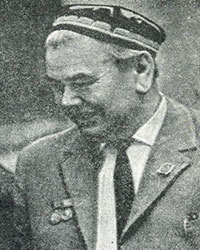SHARE WITH FRIENDS:
 Nazir Safarov, known in Uzbek literature as a publicist, essayist and playwright, was born on January 1905, 9 in Jizzakh in a blacksmith family. He studied in Soviet schools and, like the first intellectuals, went to remote villages to teach. Participation in the circle "Sanoyi nafisa" in Jizzakh determined the fate of the future playwright for life. Nazir Safarov created plays such as "History has entered the language" (1931), "Awakening" (1939), "Oriental Morning" (1954), which played an important role in the formation of Uzbek drama. The 1916 uprising in The Awakening, the October Revolution in Sharq Tongi, the national strife in History (co-authored with Ziya Said), and the struggle of the working class for novelty in Who's Wedding and Who's Mourning are the main themes. . For his great services in the field of drama, Nazir Safarov was awarded the title of "Honored Artist of Uzbekistan" (1955).
Nazir Safarov, known in Uzbek literature as a publicist, essayist and playwright, was born on January 1905, 9 in Jizzakh in a blacksmith family. He studied in Soviet schools and, like the first intellectuals, went to remote villages to teach. Participation in the circle "Sanoyi nafisa" in Jizzakh determined the fate of the future playwright for life. Nazir Safarov created plays such as "History has entered the language" (1931), "Awakening" (1939), "Oriental Morning" (1954), which played an important role in the formation of Uzbek drama. The 1916 uprising in The Awakening, the October Revolution in Sharq Tongi, the national strife in History (co-authored with Ziya Said), and the struggle of the working class for novelty in Who's Wedding and Who's Mourning are the main themes. . For his great services in the field of drama, Nazir Safarov was awarded the title of "Honored Artist of Uzbekistan" (1955).
During the war, Nazir Safarov was on the front lines, telling stories about the heroism of the warriors, the evil of the enemy, such as "Bulletless Hero", "Hero of Vodilik", "Commissar Karabaev", "Love", "Until the Last Breath", "Children of Uzbekistan", "Birth of a Hero". wrote a number of essays such as. Of particular note are his works, which he created as a promoter of innovations in life, good initiatives. The story of the "long-sighted woman" is one of them. The author's major works on modern themes, created in 1954-1957, include poems such as "School of Life", "Elmurod" (in collaboration with M. Khudoikulov).
Nazir Safarov also wrote several stories. The stories "Oltinoy", "Apple does not fall far from the apple", "How Ahmadali found his happiness" are distinguished by their ideological and artistic accuracy. His short stories "A Drop of Blood" (1967), "What I saw and experienced" (1968), and the novel "Navruz" (1973) were significant events in the literature of the 60s. For his work "What I saw and experienced" the author was awarded the Republican State Prize named after Hamza (1968).
Dedicated to the 30th anniversary of the victory over the Nazi invaders, the author created the drama "Lukash Batyr" (in collaboration with Ya. Khudoikulov), which tells the story of the heroism of Uzbek warriors.
In 1975, on the occasion of his 70th birthday, he was awarded the title of People's Writer of Uzbekistan.
Nazir Safarov died on April 1985, 1 in the city of Tashkent.